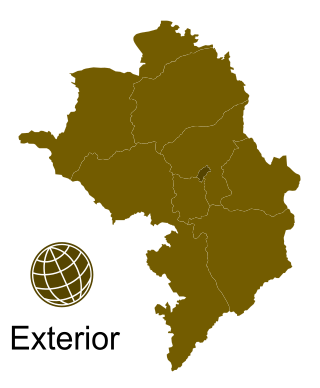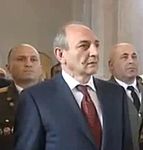
Arayik Vladimiri Harutyunyan is an Armenian politician who served as the fourth president of the Republic of Artsakh from May 2020 to September 2023. Under his predecessor Bako Sahakyan, he served as the sixth and last Prime Minister from 2007 until the abolishment of that position in 2017 and as the first State Minister of the Republic of Artsakh from 2017 until his resignation in 2018. Harutyunyan led Artsakh through the 2020 Nagorno-Karabakh War with Azerbaijan, during which the republic lost most of the territory under its control. He resigned on 1 September 2023 in the midst of the Azerbaijani blockade of Nagorno-Karabakh.
Chankatagh or Janyatag is a village located in the Tartar District of Azerbaijan, in the region of Nagorno-Karabakh. The village had an ethnic Armenian-majority population before 2023 and in 1989.
Goyarkh or Levonarkh is an abandoned village in the Tartar District of Azerbaijan, in the disputed region of Nagorno-Karabakh. The village had an ethnic Armenian-majority population in 1989.

Madagiz or Sugovushan, is a village in the Tartar District of Azerbaijan. The village had an ethnic Armenian-majority population prior to the 2020 Nagorno-Karabakh war. Madagiz was part of the Martakert Province of the breakaway Republic of Artsakh between 10 April 1994 and 3 October 2020.

Krkjan or Karkijahan is a settlement near the city of Stepanakert. The village had an Armenian-majority population prior to the Khaibalikend massacre in 1919 and subsequently an Azerbaijani-majority population prior to the Nagorno-Karabakh conflict in 1988.
Divanalılar is a village in the Fuzuli District of Azerbaijan. The village had an Azerbaijani majority prior to their expulsion during the First Nagorno-Karabakh War. It was under the control of Armenian forces of the self-proclaimed Republic of Artsakh since the First Nagorno-Karabakh War. However, it was announced to be recaptured by the Azerbaijani Army on November 7, 2020.

The Armenian-occupied territories surrounding Nagorno-Karabakh were areas of Azerbaijan, situated around the former Nagorno-Karabakh Autonomous Oblast (NKAO), which were occupied by the ethnic Armenian military forces of the breakaway Republic of Artsakh with military support from Armenia, from the end of the First Nagorno-Karabakh War (1988–1994) to 2020, when the territories were returned to Azerbaijani control by military force or handed over in accordance to the 2020 Nagorno-Karabakh ceasefire agreement. The surrounding regions were seized by Armenians under the justification of a "security belt" which was to be traded for recognition of autonomous status from Azerbaijan.

The Lachin corridor was a mountain road in Azerbaijan that linked Armenia and Karabakh.

Parliamentary elections were held in the Nagorno-Karabakh Republic on 23 May 2010.

The 2016 Nagorno-Karabakh conflict, also known as the Four-Day War, April War, or April clashes, began along the former Nagorno-Karabakh line of contact on 1 April 2016 with the Artsakh Defence Army, backed by the Armenian Armed Forces, on one side and the Azerbaijani Armed Forces on the other.

Vitaly Mikhaili Balasanyan is an Artsakhi politician and retired general. He served as the head of the National Security Council of the self-proclaimed Republic of Artsakh from November 2016 to November 2019 and again from December 2020 to January 2023. For his services in the First Nagorno-Karabakh War, he was awarded the country's highest title, Hero of Artsakh. He previously served as a member of Artsakh's National Assembly. He twice ran, unsuccessfully, for the office of President of Artsakh.

A constitutional referendum was held in the unrecognised Republic of Nagorno-Karabakh on 20 February 2017. At least 25% of registered voters needed to vote in favour in order to validate the result. The referendum passed with about three quarters of voters voting.

General elections were held in the Republic of Artsakh on 31 March 2020, with a second round of the presidential election on 14 April. Voters elected the President and 33 members of the National Assembly. It was the first time the President and National Assembly were elected at the same time.

The Second Nagorno-Karabakh War was an armed conflict in 2020 that took place in the disputed region of Nagorno-Karabakh and the surrounding occupied territories. It was a major escalation of an unresolved conflict over the region, involving Azerbaijan, Armenia and the self-declared Armenian breakaway state of Artsakh. The war lasted for 44 days and resulted in Azerbaijani victory, with the defeat igniting anti-government protests in Armenia. Post-war skirmishes continued in the region, including substantial clashes in 2022.
This is an account of engagements which occurred during the Second Nagorno-Karabakh War, primarily based on announcements from the belligerents. The war has been characterized by the use of armoured warfare; drone warfare, especially the use of Turkish-made Bayraktar TB2 and Israeli loitering munition Harop drones; heavy artillery; rocket attacks; and trench warfare. It has also featured the deployment of cluster munitions, which are banned by the majority of the international community but not by Armenia or Azerbaijan: Azerbaijan states that Armenia has deployed cluster munitions against civilians, and international third parties have confirmed evidence of Azerbaijan's use of cluster munitions against civilian areas of Nagorno-Karabakh. A series of ballistic missile attacks have inflicted mass civilian casualties in Ganja, Azerbaijan, while civilian residences and infrastructure in Stepanakert, and elsewhere have been targeted, inflicting casualties and causing extensive damage.

The 2020 shelling of Ghazanchetsots Cathedral took place prior to the Battle of Shusha on 8 October, when the Holy Savior Cathedral of the city of Shusha, known as Ghazanchetsots Cathedral, was struck twice by missiles, resulting in the collapse of a part of the roof. Armenia accused the Azerbaijani Armed Forces over the shelling.

Aras Valley campaign was a military operation launched by Azerbaijan against the breakaway Republic of Artsakh along the Aras River in the Azerbaijan–Iran border during the Second Nagorno-Karabakh War.

The 3rd Army Corps, also referred to as the Shamkir Army Corps is a regional military formation of the Azerbaijani Land Forces, concentrated against Armenian occupied territories in Nagorno-Karabakh.

In the aftermath of the Second Nagorno-Karabakh War, peacekeeping operations were initiated by Russia in the Nagorno-Karabakh region to monitor the ceasefire between the Armenian and Azerbaijani forces. Separate from the Russian operation, Turkey also has personnel working in a joint Russian–Turkish monitoring centre.
Because of the geography, history, and sensitivities of the Nagorno-Karabakh conflict, accusations, allegations, and statements have been made of involvement by third-party and international actors during the Second Nagorno-Karabakh War, including in media reports. Azerbaijan has been accused of employing Syrian mercenaries during the war, including reports by the Syrian Observatory for Human Rights (SOHR). There have also been allegations of Kurdish militia from Syria and Iraq fighting on the Armenian side, and although some third-party sources had confirmed it, some publications had considered these claims "dubious". During the war, ethnic Armenian volunteers from the Middle East, Europe, and Latin America fought on Armenian side. Both sides have denied employing mercenaries in the war, but the OHCHR had stated that there were reports about Syrian fighters motivated primarily by private gain fighting on Azerbaijan's side recruited with Turkey's assistance and foreign nationals fighting on Armenian side with motivation being investigated, calling for withdrawal of any mercenaries and related actors from Nagorno-Karabakh.
















